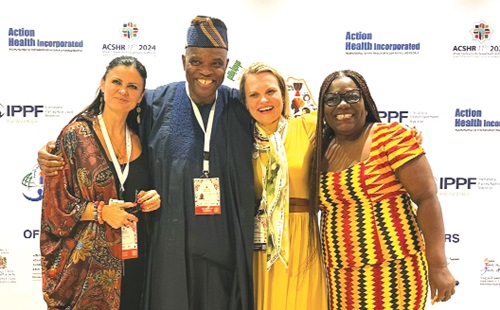
Africa needs multi-faceted approach to solve reproductive health — Nana Oye Bampoe Addo
A human rights lawyer and former Minister for Gender, Children and Social Protection, Nana Oye Bampoe Addo, says sexual and reproductive health remains a complex issue in Africa that requires a multi-faceted long-term sustained approach to deal with.
Advertisement
She said there must be sustained action by all stakeholders, gender-sensitive resource allocation that meets the needs of women and young persons in Africa, the right investment at the right time, optimising opportunities for digitalisation and technology, producing gender-sensitive data, an efficient healthcare system, high level advocacy at all levels, global, regional and national, together, with increased political commitment by governments and regional bodies.
Ms Addo who was delivering a keynote address at the 11th Conference on Sexual and Reproductive Health Rights, in Rabat, Morocco recently, also said the continent needed committed leaders to advance sexual and reproductive health.
Leading roles
She applauded the leading roles that the late Professor Fred Sai, a renowned family planning advocate, the late former United Nations Population Fund (UNFPA) Executive Director and former United Nations Under-Secretary-General, Dr Babatunde Osotimehin, and Dr Eunice Brookman Amissah, a former Minister of Health, had played in championing sexual and reproductive health in Africa.
The goal of the conference was to interrogate and expand progress on the status of the sexual and reproductive health and rights of women and youth in Africa, and to generally improve the social well-being of Africans.
It was attended by 650 delegates from 40 countries and was opened by the First Ladies of the Central African Republic and Zambia, Brigitte Touadera and Ms Mutinta Hichilema respectively.
The conference took stock of responses to sexual and reproductive health and rights of women and youth in Africa; it identified, interrogated and consolidated the best and promising sexual and reproductive rights and health policies and practices for women and youth in Africa.
Legal and policy framework
Ms Addo who spoke on ‘Advancing the Sexual and Reproductive Health and Rights of Women and Young People in Africa’, said over the last three decades, sexual and reproductive health and rights of women and young persons had advanced in Africa, albeit slowly.
She said Africa was lagging behind the rest of the world in terms of the reproductive health indicators, but had made some progress.
She added that maternal mortality in Africa had declined from 857 maternal deaths per 1000 live births in 2000 to 525 deaths per 1000 live births in 2017 while the contraceptive prevalence rate for use of modern methods among married women in Africa had more than doubled and increased from 14.7 per cent in 2000 to 27.9 in 2019 and added that 17 per cent of all women in Africa had an unmet need for family planning.
Ms Addo said even though Africa had the most progressive legal provision on abortion in article 14 of the Additional Protocol to the African Charter on Human and People’s Rights ‘the Maputo Protocol’, abortion could be provided legally upon request with no justification requirement in only four countries in Africa and so consequently, most of the abortions done in countries where it was illegal were unsafe.
She mentioned that African states had advanced in sexual and reproductive health care, because the states had, over the decades, built a strong robust legal and policy framework, globally, regionally and nationally to realise, fulfil and address sexual and reproductive health.




